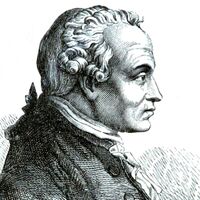This experiment succeeds as hoped and promises to metaphysics, in its first part, which deals with those *a priori* concepts to which the corresponding objects may be given in experience, the secure course of a science. For by thus changing our point of view, the possibility of *a priori* knowledge can well be explained, and, what is still more, the laws which *a priori* lie at the foundation of nature, as the sum total of the objects of experience, may be supplied with satisfactory proofs, neither of which was possible within the procedure hitherto adopted. But there arises from this deduction of our faculty of knowing *a priori*, as given in the first part of metaphysics, a somewhat startling result, apparently most detrimental to that purpose of metaphysics which has to be treated in its second part, namely the impossibly of using this faculty to transcend the limits of possible experience, which is precisely the most essential concern of the science of metaphysics. But here we have exactly the experiment which, by disproving the opposite, establishes the truth of the first estimate of our *a priori* rational knowledge, namely, that it is directed only at appearances and must leave the thing in itself as real for itself but unknown to us. For that which necessarily impels us to to go beyond the limits of experience and of all appearances is the *unconditioned*, which reason rightfully and necessarily demands, aside from everything conditioned, in all things in themselves, so that the series of conditions be completed. If, then, we find that, under the supposition that our empirical knowledge conforms to objects as things in themselves, the unconditioned *cannot be thought without contradiction*, while under the supposition that our representation of things as they are given to us does not conform to them as things in themselves, but, on the contrary, that these objects as appearance conform to our mode of representation, then *the contradiction vanishes*; and if we find, therefore, that the unconditioned cannot be encountered in things insofar as we are acquainted with them (insofar as they are given to us), but only in things insofar as we are not acquainted with them, that is, insofar as they are things in themselves; then it becomes apparent that what we at first assumed only for the sake of experiment is well founded. However, with speculative reason unable to make progress in the field of the supersensible, it is still open to us to investigate whether in reason's practical knowledge data may not be found which would enable us to determine that transcendent rational concept of the unconditioned, so as to allow us, in accordance with the wish of metaphysics, to get beyond the limits of all possible experience with our *a priori* knowledge, which is possible in practical matters only. Within such a procedure, speculative reason has always at least created a space for such an expansion, even if it has to leave it empty; none the less we are at liberty, indeed we are summoned, to fill it, if we are able to do so, with practical *data* of reason.
